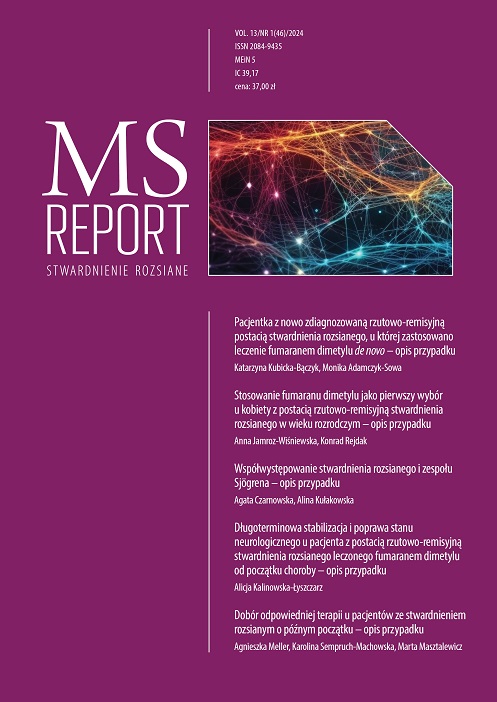Długoterminowa stabilizacja i poprawa stanu neurologicznego u pacjenta z postacią rzutowo-remisyjną stwardnienia rozsianego leczonego fumaranem dimetylu od początku choroby – opis przypadku Opis przypadku
##plugins.themes.bootstrap3.article.main##
Abstrakt
W niniejszym artykule zaprezentowano przypadek 37-letniego pacjenta, u którego uzyskano długotrwałą stabilizację przebiegu postaci rzutowo-remisyjnej stwardnienia rozsianego, brak aktywności choroby oraz poprawę stanu neurologicznego przy zastosowaniu terapii doustnej fumaranem dimetylu. Omówiono najnowsze dane z realnej praktyki klinicznej na temat bezpieczeństwa i skuteczności terapii fumaranem dimetylu, a także przedstawiono komentarz na temat czynników ryzyka oraz monitorowania i przebiegu limfopenii u pacjentów leczonych fumaranem dimetylu.
##plugins.themes.bootstrap3.article.details##
Numer
Dział
Artykuły
Copyright © by Medical Education. All rights reserved.
Bibliografia
1. Obwieszczenie Ministra Zdrowia z dnia 20 czerwca 2023 r. w sprawie wykazu refundowanych leków, środków spożywczych specjalnego przeznaczenia żywieniowego oraz wyrobów medycznych na 1 lipca 2023 r. (access: 2.01.2024).
2. Rotstein D, Montalban X. Reaching an evidence-based prognosis for personalized treatment of multiple sclerosis. Nat Rev Neurol. 2019; 15(5): 287-300.
3. Kułakowska A, Mirowska-Guzel D, Kalinowska A et al. Leczenie modyfikujące przebieg stwardnienia rozsianego. Rekomendacje Sekcji Stwardnienia Rozsianego i Neuroimmunologii Polskiego Towarzystwa Neurologicznego. Polski Przegląd Neurologiczny. 2023; 3(19): 163-89.
4. Thompson AJ, Banwell BL, Barkhof F et al. Diagnosis of multiple sclerosis: 2017 revisions of the McDonald criteria. Lancet Neurol. 2018; 17(2): 162-73.
5. Pandey K, Giles K, Balashov K et al. Long-Term Safety and Effectiveness of Delayed-release Dimethyl Fumarate in Multiple Sclerosis Patients Treated in Routine Medical Practice. Poster: P7.4-009, presented at: American Academy of Neurology (AAN) – 74th Annual Meeting 2022.
6. Fox RJ, Chan A, Gold R et al. Characterizing absolute lymphocyte count profiles in dimethyl fumarate-treated patients with MS: patient management considerations. Neurol Clin Pract. 2016; 6: 220-9.
7. Mehta D, Miller C, Arnold DL et al. Effect of dimethyl fumarate on lymphocytes in RRMS: implications for clinical practice. Neurology. 2019; 92: e1724-e1738.
8. Fox RJ, Chan A, Gold R et al. Lymphocyte decline and reconstitution after discontinuation in patients with severe, prolonged lymphopenia treated with delayed-release dimethyl fumarate. Poster: P5.366, presented at American Academy of Neurology (AAN), 21-27.04.2018, LA, USA.
9. Baeva ME, Metz LM, Greenfield J et al. Simple parameters from complete blood count predict lymphopenia, adverse effects and efficacy in people with MS treated with dimethyl fumarate. Mult Scler Relat Disord. 2023; 74: 104699.
10. Ravn J, Jensen HB, Kant M et al. Risk factors for development of lymphopenia in dimethyl fumarate-treated patients with multiple sclerosis. Mult Scler Relat Disord. 2022; 67: 104081.
11. Diebold M, Galli E, Kopf A et al. Immunological Predictors of Dimethyl Fumarate-Induced Lymphopenia. Ann Neurol. 2022; 91(5): 676-81.
12. Newman S et al. A Retrospective Chart Review of Lymphocyte Reconstitution Among MS Patients After Discontinuation of Dimethyl Fumarate. Poster no 226, presented at Virtual AAN Annual Meeting; April 17–22, 2021.
13. Berglund A, Forsberg L, Piehl F et al. Lymphocyte reconstitution following discontinuation of dimethyl fumarate (dmf) due to lymphopenia in the swedish post-market surveillance study imse-5. Poster P0351, presented at 8th Joint ACTRIMS-ECTRIMS Virtual Meeting; September 9–12, 2020.
14. Chan A, Rose J, Alvarez E et al. Lymphocyte reconstitution after DMF discontinuation in clinical trial and real-world patients with MS. Neurol Clin Pract. 2020; 10(6): 510-9.
2. Rotstein D, Montalban X. Reaching an evidence-based prognosis for personalized treatment of multiple sclerosis. Nat Rev Neurol. 2019; 15(5): 287-300.
3. Kułakowska A, Mirowska-Guzel D, Kalinowska A et al. Leczenie modyfikujące przebieg stwardnienia rozsianego. Rekomendacje Sekcji Stwardnienia Rozsianego i Neuroimmunologii Polskiego Towarzystwa Neurologicznego. Polski Przegląd Neurologiczny. 2023; 3(19): 163-89.
4. Thompson AJ, Banwell BL, Barkhof F et al. Diagnosis of multiple sclerosis: 2017 revisions of the McDonald criteria. Lancet Neurol. 2018; 17(2): 162-73.
5. Pandey K, Giles K, Balashov K et al. Long-Term Safety and Effectiveness of Delayed-release Dimethyl Fumarate in Multiple Sclerosis Patients Treated in Routine Medical Practice. Poster: P7.4-009, presented at: American Academy of Neurology (AAN) – 74th Annual Meeting 2022.
6. Fox RJ, Chan A, Gold R et al. Characterizing absolute lymphocyte count profiles in dimethyl fumarate-treated patients with MS: patient management considerations. Neurol Clin Pract. 2016; 6: 220-9.
7. Mehta D, Miller C, Arnold DL et al. Effect of dimethyl fumarate on lymphocytes in RRMS: implications for clinical practice. Neurology. 2019; 92: e1724-e1738.
8. Fox RJ, Chan A, Gold R et al. Lymphocyte decline and reconstitution after discontinuation in patients with severe, prolonged lymphopenia treated with delayed-release dimethyl fumarate. Poster: P5.366, presented at American Academy of Neurology (AAN), 21-27.04.2018, LA, USA.
9. Baeva ME, Metz LM, Greenfield J et al. Simple parameters from complete blood count predict lymphopenia, adverse effects and efficacy in people with MS treated with dimethyl fumarate. Mult Scler Relat Disord. 2023; 74: 104699.
10. Ravn J, Jensen HB, Kant M et al. Risk factors for development of lymphopenia in dimethyl fumarate-treated patients with multiple sclerosis. Mult Scler Relat Disord. 2022; 67: 104081.
11. Diebold M, Galli E, Kopf A et al. Immunological Predictors of Dimethyl Fumarate-Induced Lymphopenia. Ann Neurol. 2022; 91(5): 676-81.
12. Newman S et al. A Retrospective Chart Review of Lymphocyte Reconstitution Among MS Patients After Discontinuation of Dimethyl Fumarate. Poster no 226, presented at Virtual AAN Annual Meeting; April 17–22, 2021.
13. Berglund A, Forsberg L, Piehl F et al. Lymphocyte reconstitution following discontinuation of dimethyl fumarate (dmf) due to lymphopenia in the swedish post-market surveillance study imse-5. Poster P0351, presented at 8th Joint ACTRIMS-ECTRIMS Virtual Meeting; September 9–12, 2020.
14. Chan A, Rose J, Alvarez E et al. Lymphocyte reconstitution after DMF discontinuation in clinical trial and real-world patients with MS. Neurol Clin Pract. 2020; 10(6): 510-9.

